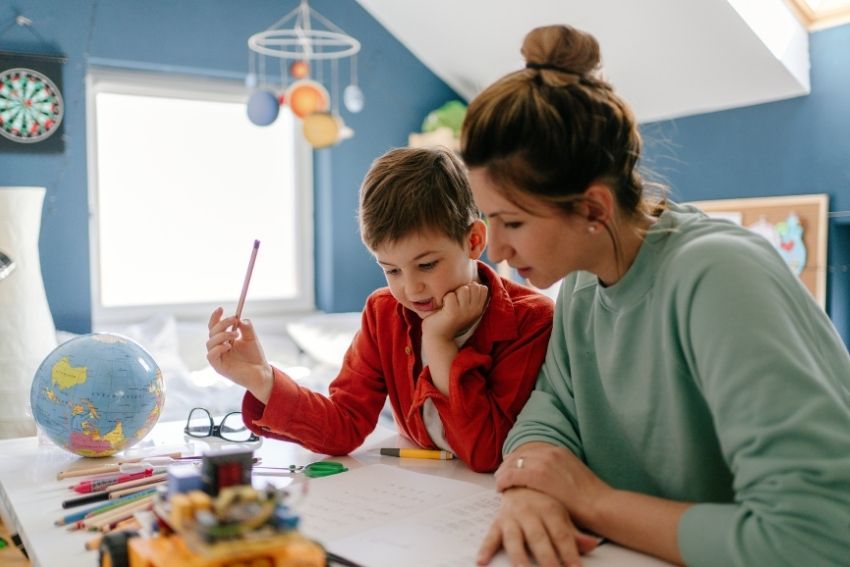Year 1 is the first official year of compulsory education in England. It’s for children aged 5 to 6. At this stage, children start their journey of formal learning in school. Year 1 follows the Early Years Foundation Stage (EYFS), which focuses on early childhood development and prepares students for more structured learning.
This year marks a key transition as children move from the play-based learning of EYFS to the more focused academic subjects in Key Stage 1 (KS1). It’s the foundation for their entire educational journey. Year 1 helps set the stage for the years to come, so it’s a vital year for both academic and personal growth.
In the British education system, Year 1 is an exciting and important milestone. As parents, you’ll see your child begin to develop new skills and knowledge, preparing them for the next steps in their academic career.

Understanding Key Stage 1 (KS1)
Key Stage 1 (KS1) includes Years 1 and 2, covering children aged 5 to 7. It is a crucial phase in your child’s education as it sets the groundwork for their learning throughout the rest of their school years. During KS1, children build on the skills and knowledge they gained during the Early Years Foundation Stage (EYFS), diving deeper into the National Curriculum subjects. As they progress from Year 1 to Year 2, they’ll continue building on these foundations while preparing for more advanced concepts.
In fact, KS1 lays the foundation for the National Curriculum, which is the framework that guides learning in schools across England. In this stage, children begin to explore subjects like English, maths, and science in a more structured way. It helps them develop the core skills they need to progress to Key Stage 2, where learning becomes more advanced in Year 4 and beyond.
As parents, understanding key stages is important because it helps you support your child’s learning at home. You’ll see them grow in confidence as they learn new things and prepare for the challenges ahead.
Overview of the Year 1 Curriculum
In Year 1, your child will be introduced to a wide range of subjects that form the foundation of their education. This broad curriculum helps children develop a variety of skills and knowledge, setting them up for future learning.
Here’s a comprehensive overview of the year 1 subjects your child will explore:
Year 1 Subjects
| Subject | Description |
| English | Children begin to develop their reading, writing, and speaking skills. Phonics, reading comprehension, and basic writing are key focuses. |
| Maths | Year 1 maths covers numbers, simple addition and subtraction, basic geometry, and measuring length, weight, and time. |
| Science | Pupils learn about plants, animals, materials, and seasonal changes. It encourages curiosity about the natural world. |
| Design and Technology | Children engage in simple design projects where they plan and create using different materials. |
| History | Basic historical concepts are introduced, such as learning about the past and comparing it to the present. |
| Geography | Children learn about the world around them, including basic map skills, and study their local environment. |
| Art and Design | Creativity is nurtured through drawing, painting, and working with different materials to express ideas. |
| Music | Pupils explore sounds, rhythm, and music-making, learning to enjoy and appreciate music. |
| Physical Education (PE) | Physical activity is key in Year 1, with a focus on developing motor skills, coordination, and teamwork. |
| Computing | Children begin to learn basic computer skills, using technology to support their learning in other subjects. |
| Religious Education (RE) | Pupils learn about different religions, their beliefs, and practices, helping them understand the world around them. |
The Year 1 curriculum is designed to be broad and balanced, ensuring children develop a wide range of skills. This variety helps children discover their interests and talents while laying a solid academic foundation for the future. So, as a parent, supporting your child in each of these areas will help them grow into well-rounded individuals, ready for the next stages of their education
Key Year 1 Subjects in Detail
English: In Year 1, English is a key focus. Your child will build a strong foundation in phonics, reading, writing, and spoken language. Phonics is particularly important as it helps children decode words, building their reading skills. They’ll learn to recognise sounds, blend them together, and apply them in reading and writing activities. These foundational skills will continue to develop throughout KS1 and into Year 3, where they’ll tackle more advanced Year 3 spelling words and patterns. Writing starts with basic sentences and progresses to more complex structures as the year progresses.
Maths: Year 1 Maths focuses on a variety of essential topics. Your child will learn number recognition and the basic operations of addition and subtraction. They’ll also begin to explore multiplication and division in simple forms, along with fractions like halves and quarters. Measurement skills are introduced, including comparing lengths, weights, and capacities. Geometry is also covered, with children learning about 2D and 3D shapes and their properties.
Science: Year 1 science introduces children to the natural world. They will explore plants, learning about what they need to grow, as well as animals, studying different species and their habitats. Children will also explore materials and their properties, such as whether they are hard or soft, flexible, or rigid.
Year 1 Expectations and Assessments
In Year 1, children are expected to make significant progress in both their academic and personal development. At this stage, they will be introduced to the key concepts of the National Curriculum, which they will build on in the following years.
Reading: Your child should be able to read simple sentences and familiar words with increasing fluency. They should also begin to develop comprehension skills, understanding the meaning of the stories they read.
Writing: In Year 1, children are expected to write simple sentences using capital letters, full stops, and basic punctuation. They will start to develop their spelling skills, focusing on both phonetic words and some common exception words.
Mathematics: Students should be able to recognise numbers up to 100, solve basic addition and subtraction problems, and understand simple concepts like shapes, measurements, and time.
How is Year 1 Progress Assessed?
Assessments in Year 1 are used to track progress and ensure that students are meeting the expected standards for their age.
- Phonics Screening Check: This is a nationwide test that takes place in June and assesses your child’s ability to decode words using their phonics knowledge. It’s designed to ensure that children are on track with their reading and helps identify those who may need additional support.
- End-of-Key Stage 1 (KS1) Assessments: These assessments are carried out at the end of Year 2 but are often based on the learning that takes place in Year 1. These are part of the national SATs system in primary education. In these assessments, children will be evaluated in reading, writing, and mathematics. The results of these assessments help teachers understand where your child is in their learning journey.

Supporting Your Child’s Learning at Home
Supporting your child’s learning at home is crucial in Year 1. There are many simple and effective ways to help them build on what they’re learning in school. One of the best things you can do is read together regularly. Reading not only helps improve their vocabulary and comprehension, but it also fosters a love for books and learning. Try to read aloud to your child every day and encourage them to read early years books independently. Ask them questions about the story to improve their understanding and make reading a fun, interactive experience.
Another helpful way to support your child is by practising phonics and year 1 common exception words. Phonics is the foundation of reading, and regularly practising the sounds of letters will help your child decode words with ease. Try using flashcards or making up fun games to make the learning process enjoyable and engaging.
Engaging in simple math activities is also a great way to support your child’s learning. You don’t need complex activities, just counting objects around the house, measuring ingredients while cooking, or playing number games can all help reinforce their maths skills. This hands-on learning approach will make maths feel more like a fun activity rather than a challenge.
By integrating these activities into your daily routine, you’ll help your child feel more confident and engaged in their learning. Remember, your involvement and encouragement play a key role in helping them reach their full potential.
Conclusion
Year 1 is a pivotal year in your child’s educational journey. It marks the transition from the Early Years Foundation Stage to more structured learning, setting the stage for everything to come. In Year 1, children start building core skills in reading, writing, mathematics, and science, alongside exploring a broad range of subjects like history, art, and physical education. It’s an exciting year full of new experiences and milestones.
The importance of Year 1 cannot be overstated; as it forms the foundation for future learning. The skills developed this year will support your child’s academic growth in the coming years. By engaging with your child’s learning at home, such as reading together, practising phonics, and exploring simple math activities, you can significantly contribute to their success.
As parents, your involvement is crucial in helping your child develop confidence and curiosity about learning. If needed, don’t hesitate to seek extra support on our online platform where you can find early years tutors. Tutors can provide personalised guidance to ensure your child stays on track and receives the attention they need to thrive.
Ultimately, the more you support and encourage your child’s education, the more confident they’ll feel as they move through their academic journey. With your help, they can reach their full potential and enjoy learning every step of the way.
FAQs:
What is Year 1 in the UK?
In the UK, Year 1 is part of the primary education system. It follows the Early Years Foundation Stage (EYFS) and is the beginning of Key Stage 1. This year focuses on developing foundational skills in subjects like reading, writing, and mathematics.
What age is Year 1?
Year 1 is the first year of formal, compulsory education in the UK. Children in Year 1 are typically aged 5 to 6.
How to support Year 1 students at home?
To support Year 1 students at home, you can encourage regular reading, practise phonics, engage in simple maths activities, and explore fun science experiments. Make learning enjoyable and interactive to help your child build confidence and reinforce what they’re learning in school.
What should Year 1 be reading?
Year 1 students should be reading books with simple sentences, basic vocabulary, and familiar words. Look for books that encourage phonics practice, have repetitive text, and allow children to decode words. Levelled readers are also a good choice to support their reading progress.








